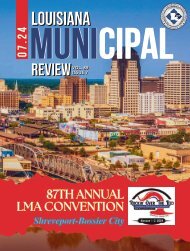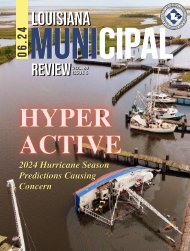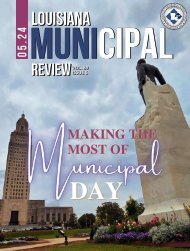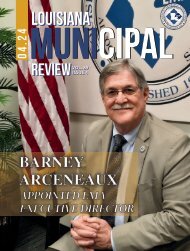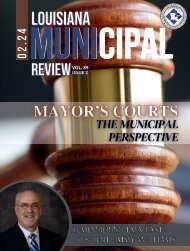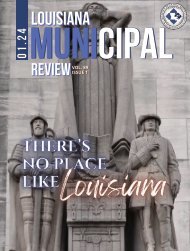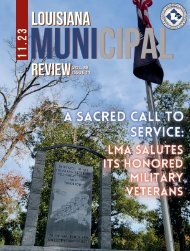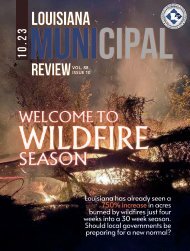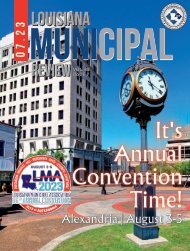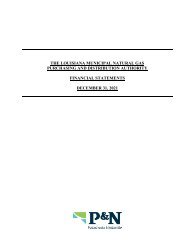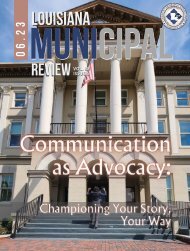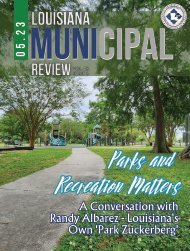August/September 2023
You also want an ePaper? Increase the reach of your titles
YUMPU automatically turns print PDFs into web optimized ePapers that Google loves.
LEGAL BRIEFS<br />
Legislative Session Expands Sunshine Laws<br />
US Supreme Court Justice Louis D.<br />
Brandeis, a towering legal and judicial<br />
figure who largely shaped American<br />
jurisprudence, noted, “sunlight is said to<br />
be the best of disinfectants;” Dalai Lama<br />
opined, “A lack of transparency results in<br />
distrust and a deep sense of insecurity;”<br />
and Founding Father Patrick Henry famously<br />
declared, “The liberties of a people<br />
never were, nor ever will be, secure,<br />
when the transactions of their rulers<br />
may be concealed from them.”<br />
Louisiana’s Public Records Law and<br />
Open Meetings Law are rooted in these<br />
concepts, and flow from the principle<br />
articulated in Article XII, Section 3 of the<br />
Louisiana Constitution: “No person shall<br />
be denied the right to observe the deliberations<br />
of public bodies and examine<br />
public documents, except in cases<br />
established law.”<br />
Nearly every legislative session, there<br />
are bills that would alter aspects of one<br />
or both of these “Sunshine Laws,” but<br />
the <strong>2023</strong> Regular Session ushered in<br />
substantive changes of which municipal<br />
leaders should be aware.<br />
It has long been the case that a public<br />
records custodian may charge a requestor<br />
for making copies of public records<br />
and may also demand payment<br />
in advance of providing the responsive<br />
records to the requestor. Last year, the<br />
law was tweaked to specifically provide<br />
that such reproduction fees may include<br />
the transmission of electronic copies of<br />
public records (i.e., providing records<br />
via email, shared cloud-based apps, and<br />
more). Admittedly, the fee schedule for<br />
electronic transmission of electronic<br />
records can be hard to promulgate, as<br />
electronically stored data can be difficult<br />
to paginate. Nonetheless, the law<br />
empowers custodians to charge for<br />
both hard-copy and electronic reproduction<br />
of records.<br />
This year, the legislature again amended<br />
the Public Records Law to add a new<br />
mandate: “Any custodian who elects to<br />
establish and collect such fees shall establish<br />
a reasonable fee schedule and<br />
post the schedule where it can be readily<br />
accessed by the public.” (Act 247 of<br />
<strong>2023</strong>) This means that any municipality<br />
who wishes to charge a fee for the reproduction<br />
of records, whether by hard<br />
copy or electronic means, MUST have a<br />
clearly defined fee schedule, and must<br />
further make that fee schedule “readily<br />
accessible” to the public. This would<br />
certainly include having the fee schedule<br />
readily available at municipal buildings<br />
and on the municipality’s website.<br />
In short, use all reasonable diligence to<br />
make the fee schedule easy to find for<br />
anyone seeking to access public records.<br />
The Open Meetings Law sustained an<br />
even greater shift. Act 393 of <strong>2023</strong> added<br />
two new obligations for municipalities,<br />
both rooted in ADA-recognized disabilities.<br />
Every municipal government<br />
must now adopt rules, regulations, and<br />
procedures to accommodate participation<br />
in their public meetings by members<br />
of the public with disabilities recognized<br />
by the Americans with Disabilities<br />
Act; AND the municipality must also<br />
adopt rules, regulations, and procedures<br />
to allow any member of the municipal<br />
board of aldermen/council with an<br />
ADA-recognized disability to participate<br />
and vote via electronic means. Further,<br />
if a member of the body is participating<br />
remotely under this new provision, it automatically<br />
triggers a requirement that<br />
the municipality open up public participation<br />
via “electronic means,” which is<br />
broadly defined to include teleconferencing<br />
and/or video conferencing.<br />
To assist our members in complying<br />
with these new ADA-based open meetings<br />
requirements, the LMA will publish<br />
model guidance on our website<br />
under the “Publications” tab, which will<br />
be available starting <strong>September</strong> 1. The<br />
full text of both legislative acts may be<br />
found at www.legis.la.gov under the<br />
“Bills” tab.<br />
Editor’s Note: The information provided<br />
in this column is not a replacement for<br />
consultation with your own municipal<br />
attorney, and it should not be considered<br />
legal advice for any particular case or<br />
situation.<br />
by Karen Day<br />
White<br />
LMA Executive<br />
Counsel<br />
White is a member of the LMA Legislative<br />
Advocacy Team and can be reached at<br />
kwhite@lma.org.<br />
LMR | AUGUST/SEPTEMBER <strong>2023</strong> Page 9



